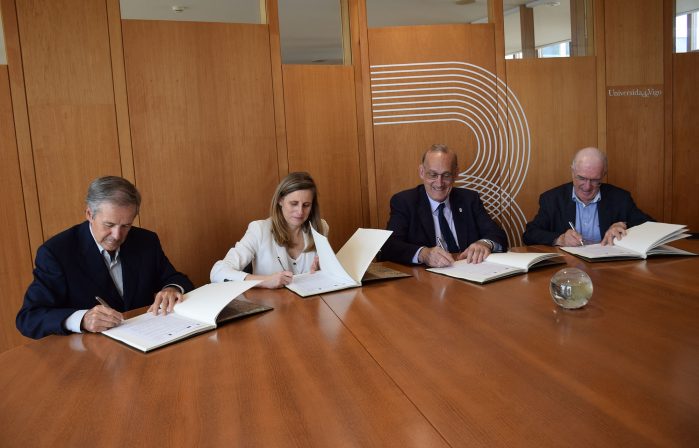
-
Facultade de Económicas
Universidade de Vigo
-
observatorio.eolico@uvigo.gal
-
New Agreement for the Operation and Financing of the Observatory
- Home
- Wind World
- New Agreement for the Operation and Financing of the Observatory

- by OEGA
- 0 Comments
At the end of 2018, the University of Vigo, the Juana de Vega Foundation, and the Isla Couto Foundation launched the Galician Wind Energy Observatory (GWO). After four years, these three institutions have renewed and expanded their collaboration agreement by including the Paideia-Galiza Foundation. In a ceremony held at the Vigo campus last week, the new two-year agreement was signed by Manuel J. Reigosa, Rector of the University of Vigo; Enrique Sáez, President of the Juana de Vega Foundation; Manuel Meixide, President of the Isla Couto Foundation; and María Cotón, Secretary of the Board of Trustees of the Paideia-Galiza Foundation.
In the advent of this new agreement, the GWO ensures its continuity and will continue to offer its services as a source of information, dissemination, and advice to forest communities, municipalities, and social agents, to thereby generate significant social value. Furthermore, the inclusion of the Paideia Foundation will allow the GWO, as stated in the agreement, “to increase its capacity for action and the social impact of the activities” of this “joint initiative in favor of Galicia’s rural development.”
Civil society promoting a fair distribution of resources
During the ceremony, the Rector expressed great satisfaction for this signing that permits “civil society to take an initiative that brings out the best in us, because the scientific knowledge of the Observatory’s researchers will help us if we want to build a more sustainable, fair, solidary, and prosperous Galicia.” In this regard, Reigosa pointed out the need for “a fair distribution of resources” and the use of “all scientific knowledge to make this available to society.” In this specific case, this is being done through the efforts of the Research Group on Ecological Economics, Agroecology, and History, the core of the Observatory led by Professor Xavier Simón. The Rector also thanked the three foundations for their contributions to this project with a reminder that “Galicia cannot turn its back on renewable energies, but it makes all the sense to put these energies at the service of the country as a whole rather than at the service of a few interests.”

On behalf of the Paideia-Galiza Foundation, its Secretary highlighted that becoming part of this organization “is a demonstration” of the entity’s commitment “to Galician society, rural development and, above all, the preservation of the natural environment.” Furthermore, she highlighted it as an opportunity to give added value to “the transparency with which the researchers inform and advise/counsel on the development of wind energy.”
For Enrique Sáez, President of the Juana de Vega Foundation, the signing of the new GWO agreement represents the renewal of the entity’s commitment to Galician civil society, rural development, and sustainable land use, which is one of the main resources of the autonomous community. In this moment of energy transition and the focus on cleaner and more environmentally friendly energies, Sáez defended the need to maintain mechanisms like the GWO that promote transparency in the process of occupying areas with wind potential, to improve life in the surrounding areas, and facilitate a diversity of production initiatives.
Advice to landowners in the pursuit of greater energy justice
Galicia is a powerhouse when it comes to wind energy. However, landowners and local agents have had limited participation in the development of the wind energy process, both in its planning and in obtaining income from wind activity. This is why the University of Vigo, the Juana de Vega Foundation, the Isla Couto Foundation, and the Paideia Galiza Foundation agree on the need to work towards greater energy justice and emphasize that progress is required both in planning and rational decision-making to promote mechanisms that increase the wind income received by landowners and local entities to ensure the country as a whole benefits from the capacity to generate this type of clean energy.
In this context, and thanks to this new collaboration agreement, the Observatory will continue working to promote transparency in the occupation of areas with wind potential. Specifically, actions will be carried out to promote the transfer of quantitative and qualitative information among participating agents, thereby favoring transparency in the processes of land occupation for wind farms and demonstrating its positive impact on rural areas. Additionally, this will enable the GWO to propose regulatory changes in the fields of territorial and energy planning, as outlined in the agreement. In fact, the document establishes six strategic work areas for this new phase that includes creating a repository of legal, economic, and environmental information on wind farms; conducting a socioeconomic and institutional analysis of wind energy; continuing to provide advice to rural agents; monitoring the repowering processes of wind farms; supporting community initiatives for clean energy transition, and globally disseminating the work carried out by the Observatory.